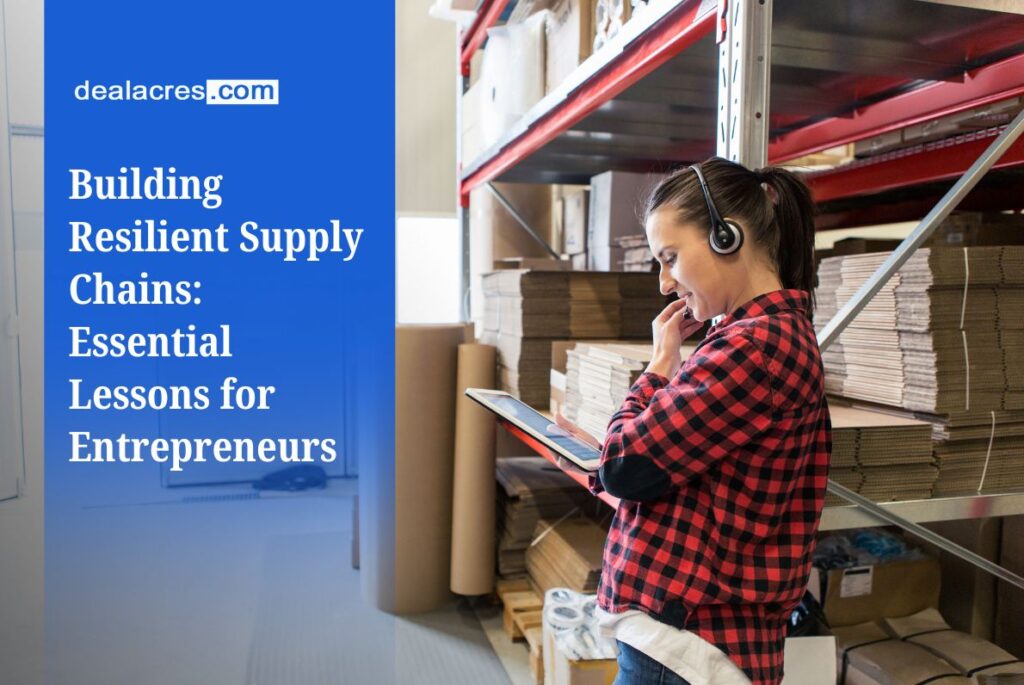In today’s fast-paced and interconnected world, building a resilient supply chain is crucial for the success of any business. A resilient supply chain ensures that a company can withstand disruptions and challenges, such as natural disasters, economic downturns, or global pandemics, while still delivering products and services to customers efficiently and effectively. In this article, we’ll explore the importance of resilient supply chains for entrepreneurs and discuss key strategies to build and maintain them.

Understanding Resilient Supply Chains
A supply chain is a network of organizations, people, activities, information, and resources involved in the production and distribution of goods or services. It encompasses everything from sourcing raw materials to delivering the final product to customers. A resilient supply chain can adapt and respond quickly to unexpected events or changes in the environment, minimizing disruptions and ensuring continuity of operations.
Importance of Resilient Supply Chains for Entrepreneurs
For entrepreneurs, especially those operating small or medium-sized businesses, having a resilient supply chain is vital for several reasons:
- Mitigating Risks: A resilient supply chain reduces the risk of disruptions, such as supplier failures, transportation delays, or natural disasters, which can have a significant impact on business operations and profitability.
- Maintaining Customer Trust: By ensuring consistent product availability and timely delivery, entrepreneurs can maintain customer trust and loyalty, even during challenging times. This can lead to repeat business and positive word-of-mouth recommendations.
- Adapting to Market Changes: A resilient supply chain enables entrepreneurs to adapt quickly to changes in market conditions, such as shifts in consumer preferences, new regulations, or unexpected fluctuations in demand. This agility allows businesses to stay competitive and seize new opportunities.
- Enhancing Operational Efficiency: By streamlining processes, optimizing inventory management, and improving collaboration with suppliers and logistics partners, entrepreneurs can enhance the efficiency and cost-effectiveness of their supply chains, leading to higher profitability.

Key Strategies for Building Resilient Supply Chains
Now that we understand the importance of resilient supply chains, let’s explore some key strategies that entrepreneurs can implement to build and maintain them:
- Diversify Suppliers: Relying on a single supplier for critical components or materials can be risky. By diversifying their supplier base, entrepreneurs can reduce the impact of supplier disruptions and ensure a steady supply of essential inputs. This may involve sourcing from multiple vendors or establishing backup suppliers for key items.
- Strengthen Relationships with Suppliers: Building strong and collaborative relationships with suppliers is essential for a resilient supply chain. Entrepreneurs should communicate openly with their suppliers, share information about their business needs and priorities, and work together to identify potential risks and develop contingency plans.
- Invest in Technology and Automation: Leveraging technology and automation can improve visibility and control over the supply chain, enabling faster decision-making and response to disruptions. Entrepreneurs can invest in tools such as inventory management software, supply chain analytics, and automated order processing systems to streamline operations and enhance resilience.
- Develop Contingency Plans: It’s essential to have contingency plans in place to address potential disruptions before they occur. Entrepreneurs should identify key risks to their supply chain, such as supplier failures, transportation bottlenecks, or natural disasters, and develop strategies to mitigate these risks. This may involve stockpiling inventory, establishing alternative transportation routes, or securing backup suppliers.
- Focus on Sustainability: Building a sustainable supply chain not only reduces environmental impact but also enhances resilience. Entrepreneurs can source materials from sustainable sources, minimize waste in production processes, and invest in renewable energy solutions to reduce dependency on fossil fuels. By embracing sustainability, businesses can future-proof their supply chains and appeal to environmentally-conscious consumers.
- Stay Informed and Flexible: In today’s dynamic business environment, staying informed about global trends, market developments, and emerging risks is essential. Entrepreneurs should monitor news and industry publications, participate in trade associations and networking events, and maintain open lines of communication with stakeholders. Being flexible and adaptable allows businesses to pivot quickly in response to changing circumstances and maintain resilience.

Resilient Supply Chains:
Incorporating resilient supply chain practices into your business operations can safeguard against unforeseen disruptions and ensure continuity in delivering products and services to your customers. As an entrepreneur, investing in resilience today can pay dividends in the future, providing a solid foundation for growth and prosperity amidst uncertainty.
Conclusion
In conclusion, building a resilient supply chain is critical for the success and sustainability of entrepreneurs in today’s competitive marketplace. By implementing strategies such as diversifying suppliers, strengthening relationships, investing in technology, developing contingency plans, focusing on sustainability, and staying informed and flexible, entrepreneurs can enhance the resilience of their supply chains and position their businesses for long-term success. In an unpredictable world, resilience is not just a competitive advantage – it’s a necessity.




